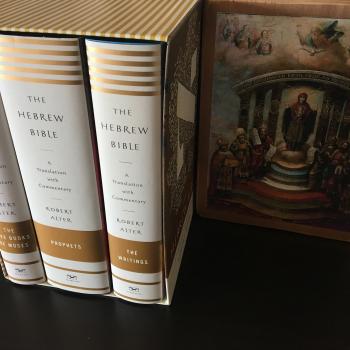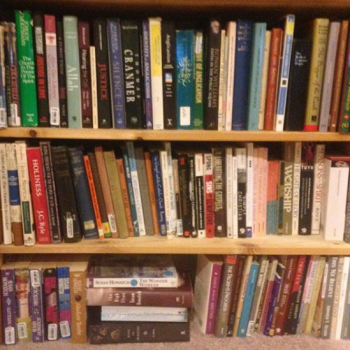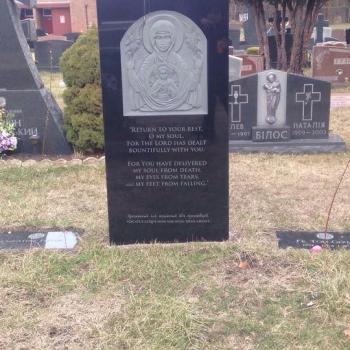The time has come. I wasn’t quite sure when we were going to talk about race and ‘classical Christianity’ in such a way as to upend the tacit assumption that ‘classical Christianity’ was the exclusive domain of white males. But Mike Chase has written quite the evangelical response to Douglas Todd on sin and hypocrisy, and I figure that this is as good a time as any to sketch some out some of the implications of what both Chase and Todd have written.
On the surface, neither Chase nor Todd have written anything to do with race. Todd’s bit is about psychology:
Jesus was a great psychologist. He had antennae for hypocrisy, especially among self-satisfied religious leaders. He challenged people who had a sense of moral superiority with admonitions about not “casting stones” and looking at the “log in one’s own eye.” Liberal Christians appreciate Jesus’ insight into the power of psychological projection, which leads judgmental people to fantasize others carry the bad traits they are denying in themselves. Jesus’ wisdom about hypocrisy relates today to self-righteous people who are quick to label others as “racist,” “competitive” or “greedy.”
As Todd would remind me, to use this snippet to talk about any kind of ‘unconscious racism‘ might be stretching the capabilities of this paragraph; indeed, in a quiet nod to South China Morning Post‘s Ian Young’s stories about ‘racism’ and Vancouver’s property market, his veiled reference to ‘self-righteous people who are quick to label others as “racist”‘ is directed to Young’s frighteningly competent investigative journalism into how wealthy condo developers use accusations of ‘racism’ in attempts to shut down discussion of offshore money in Vancouver’s property market. From the outset, I’ll write as a disclaimer that I am not calling anyone racist in this piece on the implications of what Todd has written for a conversation about race.
The same might be true of Chase’s post. On the surface, Chase’s response to Todd has nothing to do with race and everything to do with reinforcing a dialectic between humans and God. Much more than the other two on St. Peter’s Fireside’s staff (whose theologies seem to veer in more Catholic directions), Chase’s theological articulation seems to place a very (Protestant) differentiation between that which happens on a human plane and that which occurs on a divine axis. Within this theological framework, Chase reads those whom Jesus exposes as hypocrites as imputationally sinful in relation to God, that is, while a Jew identifying as a Pharisee (part of a first-century elite Torah-keeping sect) might not be personally an ‘extortioner, unjust, adulterer, and tax-collector,’ God might see him (to my knowledge, the sect wasn’t gender-inclusive — but I could be wrong!) as an extortioner, unjust, adulterer, and tax-collector on a different ‘frame of reference’ — a spiritual one in which the religious elite were taking advantage of the people of God and selling out to the powers that be. While such assertions might be an exegetical stretch in some places, the framework itself can be pieced together from parts of St. John’s Gospel and St. Paul’s letters, especially through a Calvinist reading in which the knowledge of God is the glorious light and mirror that exposes true human depravity. In other words, I may not agree with Chase’s exegesis in places, but it doesn’t mean that I don’t see where Chase is coming from. In turn, I’m very sure that Chase had no intention to write anything about race, and as a point of clarification, by writing about race in Chase’s theological framework, I am not calling Chase a racist — because he isn’t!
So if neither Todd nor Chase have written anything about race, then why write about race?
Easy. Because it’s hidden in plain sight.
When Todd and Chase write about Jesus’ exposure of the religious elite in first century Palestine, that establishment was Jewish. To be sure, I have read enough of philosopher Hannah Arendt to avoid the anachronistic stupidity of calling ‘the Jews’ a ‘race’ in first-century Palestine, especially when Arendt does such a brilliant analysis of how Jewishness became a ‘race’ in nineteenth-century Europe in The Origins of Totalitarianism (I am, of course, also keenly aware of Arendt’s contested status in Jewish studies because of her New Yorker articles, Eichmann in Jerusalem). But all things being equal with Arendt’s analysis, this doesn’t stop anyone from saying that the Jews and the Romans existed in — shall we say? — a colonial situation in first-century Palestine.
And that’s where a lot of the mess around anti-semitism in the modern West originated.
However one qualifies the notion that it was the religio-political establishment complex of first-century Palestine and not the Jews who killed Jesus (Benedict XVI is especially careful about this in his second installment in the Jesus of Nazareth series), the structuring power of the Roman occupation on the various political factions in first-century Palestine has to be taken into account. This is where my point about ‘race’ — or more properly, racialization, i.e. the process by which racial consciousness is formed — comes into play. As a diverse chorus of New Testament scholars observe, ‘Jewishness’ was a contested category in Jesus’ world, in large part because the Roman occupation produced a variety of political stances as to how the occupied people — the ‘Jews’ — should relate to this pagan empire. Should they cooperate with the occupation? Should they resist it? Should they resist violently? And how should they as a people be defined? Talk about psychology. Talk about the designs of the human heart. Yes, talk about it all because this context takes the framing outside of merely individual agency, personal corruption, and spiritual elitism to an entire colonial structure and its political fragmentation that structures personal agency.
By most accounts, that’s also the context in which Jesus was crucified. When Jesus proclaimed the ‘kingdom of God’ with the full implications of Hebrew Scripture, you could say that Jesus was wading into the political fray. As Todd and Chase would both affirm, one way to put it was that Jesus was killed because he exposed the powers that vied for political control over Palestine as just that: powers, often with a bent toward some kind of violence and exclusion. As each of the Gospel accounts detail in their own particular ways, these powers — including the Roman occupiers — while all in competition against each other — agree on one thing — kill that Galilean prophet. As St. Paul later writes in a letter to the Colossian church, this epic collusion to put Jesus on the cross unmasked the hidden violence of all of these powers, both colonizer and colonized.
And yet, as accounts of Jesus’ death were circulated through Jesus’ followers and as Jesus’ followers themselves refused to join in the increasingly hostile Jewish resistances against the Roman occupation, the fact that Jesus had himself waded into the Jewish debate as a Jewish rabbi became transformed into how Jesus had been killed by these people called ‘the Jews.’ As Christianity became the official Roman state religion, the category of ‘Christian’ became distinct from that of the ‘Jews’ — not that they had always been together, but Christianity was an inconvenient ‘Jewish sect’ because it was uncategorizable and thus unmanageable prior to Constantine — and as this happens, the ‘Jews’ become a problem. Where Christians were once the uncategorizable and unmanageable distinct people, this onus now fell to the Jews, who became victims of persecution often perpetrated by Christians in power. Fast-forwarding centuries and millennia of Jewish history, and this baggage adds up to the Jews becoming considered a distinct ‘race’ in Europe (see Arendt’s Origins for the brutal blow-by-blow details), leading fatefully to the events of anti-semitic fascist nation-building in Europe in which governments like Nazi Germany embarked on an increasingly violent campaign to exterminate the Jews.
Given our post-Shoah context, that’s why it’s superlatively important to not carelessly use the word ‘Pharisee’ or ‘Sadducee’ as convenient ideal types for ‘religious elites’ — that’s because, given the baggage of Christian history, they’re racially charged. In fact, this is the current that runs through theologian J. Kameron Carter’s Race: A Theological Account. Although many have misread Jonathan Tran to say that Carter and his colleagues are proposing a ‘new black theology’ (while they are all African American, their work is more properly a ‘theology of race’ that transcends black experiences), Carter draws on Denise Kimber Buell’s work on ‘race’ in early Christianity. What happened, Carter and Buell both point out, is that the classical understanding of Jesus as embodied within a Jewish body fell victim to elitist heresies that proposed that secret spiritual practices could lead to the rise of a new, elite ‘race’ of humans. In other words, the rise of such race-thinking and anti-semitism is in fact an elitist betrayal of classical Christian teachings. For Carter, that kind of race-thinking that grew out of ancient heresies became planted in turn in modern European Christian consciousness, leading (as Carter’s colleague Willie Jennings outlines in The Christian Imagination) to the justification of the slave trade, the occupation of indigenous lands, and the orientalism-driven colonization of the ‘inferior’ races.
That brings us to Dietrich Bonhoeffer. Whether one thinks his ‘religionless Christianity in a world come of age’ should be classified as ‘liberal’ (as Harvey Cox does) or ‘classical’ (as Stanley Hauerwas does), at the overlooked heart of Bonhoeffer’s theology is a brilliant analysis of ‘sin’ and ‘ethics’ that is classically rooted in the story of the Fall. From Sanctorum Communio to Creation and Fall to Discipleship to Life Together to Ethics to Letters and Papers from Prison, the beating heart of Bonhoeffer’s theology revolves around a meditation on the fruit of the tree of the knowledge of good and evil. For Bonhoeffer, a Christian ethics that takes its beginning by defining what is good and evil has forgotten the real beginning, in which God exists in relation to his people and his people have a social life based on communion with the other. One of the concrete levels where Bonhoeffer saw this play out was in Harlem’s Abyssinian Baptist Church, where Bonhoeffer witnessed how American attempts to define the color line led to segregation and all kinds of economic injustices and psychological damage. In other words, the very structuring categories of race and their everyday effects are themselves evidence of the fact that the fruit of the tree of knowledge of good and evil have been eaten. As theologian of race Brian Bantum argues, Bonhoeffer calls us back again to a classically Christian understanding of sin and discipleship, for ‘sin’ is simply having followed these invented definitions of good and evil while Christian discipleship is about returning to the beginning sociality based on relationality.
What I’m saying is that race is a window into understanding Jesus as both a psychologist and a physician for the human heart. That’s because there are the concrete political effects of sin — i.e. eating of the fruit of the tree of knowledge of good and evil by engaging in the politics of sovereign definition — are all on display. And as Todd and Chase would both agree, the church should examine her own hypocrisy and corruption. I’m just saying that when that examination takes place, this is likely a lot of what will be found. And when that church hears the voice of Jesus afresh, it will not simply be as a psychologist or a physician for the human heart, but as having spoken through the anti-racist prophets that the time has come, the kingdom of God is at hand, and that all things, including and especially the racializing structures of modernity, are about to be made new.
Having talked much about the rise of the state and tendencies toward political corruption, we look forward with great anticipation to an engagement with the question of whether governments are a force for good in the world.











